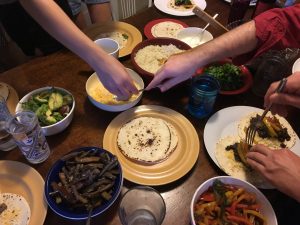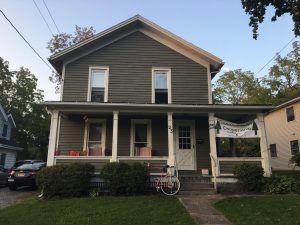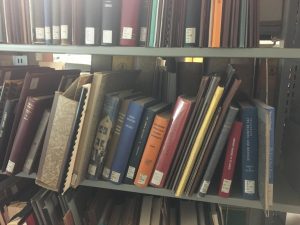I finally got to have an in-depth, one-on-one conversation with the archivist today after my class. Liz Argentieri pulled up a couple of documents about the Shakers, as I had informed her about our class text’s chapter on the community. She told me that, in a town ten minutes from my school, there existed our very own Shaker community, now the site of Groveland’s Correctional Facility. Funny how things turn out.
As we sat at a small desk in the room containing the Geneseo town archive, Argentieri explained to me the difference between the two rooms; the town archive in one room is more free to the public, where students and townspeople are able to browse after having the room unlocked by the librarian. The other archive, or what Argentieri was explaining as less of a legitimate archive, holds historical documents from SUNY Geneseo as a university. Here, documents like school newspapers or meeting minutes are kept and only in an extremely rare instance is anyone, besides the library’s staff, allowed to peruse its shelves. Those interested in particular documents should request them and a member of the staff will enter the room to remove the records for them. In general, she explains that neither of these rooms abide by the strict definition of an archive — if they did, she briefly explained the tedious process of removing records that have expired and are no longer necessary.
Argentieri also searched Geneseo’s online database with me, using particular keywords that might engage something within the archives. Using the search term “commun*,” we already found a lot of activity and I plan on looking into that further. Hey, if the Shakers set up a community close by, who’s to say that Geneseo doesn’t have a rich history of intentional communities? Who’s to say Livingston County’s intentional communities just haven’t been compiled into a book yet? This is why archival work is so interesting.
I left the library at 5pm today (I’m back again, making this my fourth stay here in the past 24 hours) with such an excitement about me. Recently, I’ve been going through old scrapbooks in my sorority house (founded in 1885), and although I’d love to see the old old records (I’m talking back in the day when we were founded as a literary society), I’m sure they’re long gone. The other day, I flipped through the pages of a 1988 binder where I found typewriter-printed pages full of meeting minutes, letters addressed to Governor Mario Cuomo (asking if he’d please be our commencement speaker — he rejected), and old court case files from when someone burglarized our home. Other than the thrill of looking through these blasts from the past, I feel a deep disappointment in myself, now Recording Secretary and Cabinet member in my sorority, that we don’t print things anymore. Actually, scratch that — that we don’t save things anymore. (Save trees). Funny enough, just today we were surprised to open the door to see two women in their late 50s, alumni. They told us they lived at the house in 1974! I remembered exactly where I had seen the scrapbook from that year and pulled it down from the shelf for them to look at. (Am I my own kind of archivist now?). Anyway, you can tell the meeting with the archivist went really well and I’m excited to be able to log our community’s documents in an orderly and accessible way.
Cody and I loved our dinner at the co-op. We enjoyed a delicious vegetarian taco meal and shared our “rose,” “thorn,” and “buds” of the day/week. The rose means you describe the best part of your day, the thorn the worst, and the bud is something you’re looking forward to. Many of us mentioned being done with schoolwork and enjoying the weekend as our “buds.” I felt like I was among a group of casual friends, and was invited to come hangout at the co-op anytime.
Later, on the walk home, Cody and I asked each other whether or not this was “the one,” the community we’d like to research. Cody mentioned wanting to check out the monastery down the road a bit before we decide which I agreed to. I think as far as accessibility and ability to archive data, the co-op seems like a great place to start this journey. In a way, I feel like I’m journeying with the co-op on their way toward hopeful success. Plus, one of their extremely impressive members has already transferred all of their documents onto Google Drive so that new members have a record of the group’s history and are given a working guideline of how to run the organization.
Here are some pictures of the outside of the co-op, and the amazing meal we enjoyed as a group:



